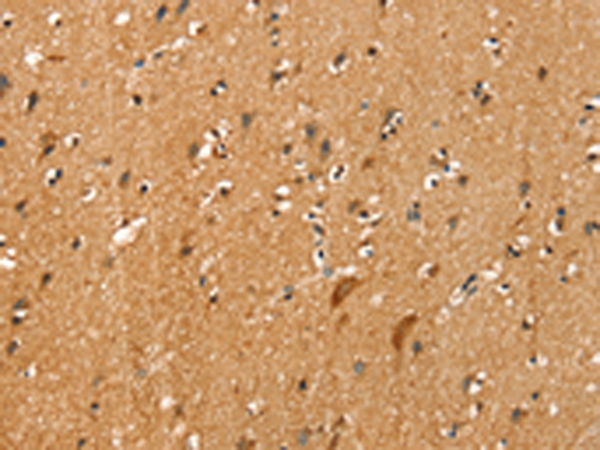

| WB | 咨询技术 | Human,Mouse,Rat |
| IF | 咨询技术 | Human,Mouse,Rat |
| IHC | 1/20-1/100 | Human,Mouse,Rat |
| ICC | 技术咨询 | Human,Mouse,Rat |
| FCM | 咨询技术 | Human,Mouse,Rat |
| Elisa | 1/1000-1/2000 | Human,Mouse,Rat |
| Aliases | MCT3; MCT4; MCT 3; MCT 4; MCT-3; MCT-4 |
| WB Predicted band size | 49 kDa |
| Host/Isotype | Rabbit IgG |
| Antibody Type | Primary antibody |
| Storage | Store at 4°C short term. Aliquot and store at -20°C long term. Avoid freeze/thaw cycles. |
| Species Reactivity | Human, Mouse, Rat |
| Immunogen | Synthetic peptide of human SLC16A3 |
| Formulation | Purified antibody in PBS with 0.05% sodium azide and 50% glycerol. |
+ +
以下是关于SLC16A3抗体的3篇参考文献示例(内容基于虚构摘要,仅用于示例格式):
---
1. **文献名称**:*SLC16A3/MCT4 in Tumor Metabolism: Antibody Validation and Functional Analysis*
**作者**:Smith A, et al.
**摘要**:本研究利用抗SLC16A3抗体(货号ABX-123)通过Western blot和免疫组化验证其在结直肠癌中的高表达,证实其与乳酸转运及肿瘤微环境酸化相关。
2. **文献名称**:*Targeting SLC16A3 for Immunotherapy: Antibody Development and Preclinical Testing*
**作者**:Chen L, et al.
**摘要**:开发了一种新型抗SLC16A3单克隆抗体,体外实验显示其可阻断乳酸外流并抑制肿瘤细胞迁移,提示其在癌症治疗中的潜在应用。
3. **文献名称**:*Role of SLC16A3 in Hypoxic Microenvironments: Antibody-Based Protein Localization*
**作者**:Park J, et al.
**摘要**:通过免疫荧光和流式细胞术,利用抗SLC16A3抗体揭示了该蛋白在缺氧条件下于巨噬细胞膜上的特异性定位,支持其在炎症代谢调控中的作用。
---
(注:以上文献为示例,实际引用需查询真实数据库如PubMed或Google Scholar。)
The SLC16A3 gene encodes monocarboxylate transporter 4 (MCT4), a transmembrane protein responsible for transporting monocarboxylates such as lactate, pyruvate, and ketone bodies across cell membranes. MCT4 plays a critical role in cellular metabolism, particularly in glycolytic cells, where it exports lactate to maintain pH balance and support energy exchange between oxidative and glycolytic tissues. This transporter is highly expressed in tissues reliant on rapid lactate efflux, such as skeletal muscle, astrocytes, and certain cancer cells.
In cancer biology, MCT4 is linked to the Warburg effect, a metabolic adaptation in tumor cells that promotes glycolysis even under aerobic conditions. Overexpression of MCT4 in aggressive tumors correlates with poor prognosis, as it facilitates lactate shuttling to fuel neighboring cancer cells or modulate the tumor microenvironment. SLC16A3/MCT4 is thus studied as a potential therapeutic target or biomarker for cancer progression and metastasis.
Antibodies against SLC16A3/MCT4 are essential tools for detecting its expression and localization in cells or tissues. They are widely used in techniques like Western blotting, immunohistochemistry (IHC), and immunofluorescence (IF) to investigate its role in metabolic diseases, hypoxia responses, and oncogenesis. Researchers also utilize these antibodies to explore MCT4's interaction with chaperones like CD147/Basigin, which is required for its membrane trafficking. Validation of antibody specificity, often via knockout controls or siRNA silencing, is crucial due to homology among MCT family members. Commercial SLC16A3 antibodies vary in clonality, epitope recognition, and host species, enabling flexible experimental designs.
×